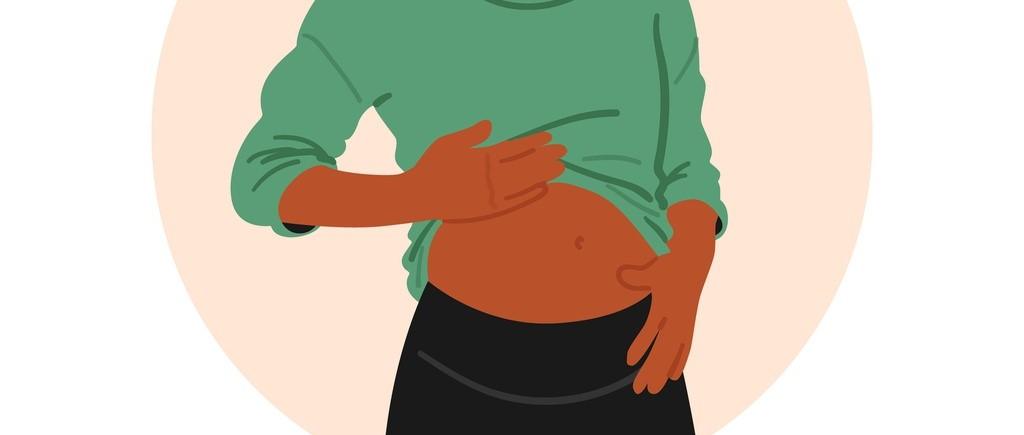
Connaissez-vous les premiers signes du cancer de l'ovaire ?
Peer reviewed by Dr Krishna Vakharia, MRCGPLast updated by Amberley DavisLast updated 16 Feb 2024
- TéléchargerTélécharger
- Partager
Just one in five women realise bloating is a symptom of ovarian cancer. Early diagnosis makes the disease easier to treat, so it's important to be aware of the signs.
Dans cet article :
Persistent and constant bloating could be a symptom of ovarian cancer - the sixth most common cancer among UK women.
Laura Everley, from West Sussex, was diagnosed with ovarian cancer in 2014, in her 30s.
She says: "Before I was diagnosed I was experiencing all of the symptoms of ovarian cancer, including bloating. I thought that I might have irritable bowel syndrome. I'd even tried going gluten-free, but it made no difference. The idea of cancer hadn't even entered my head. You just never dream this is going to happen to you."
Research produced in 2023 by Target Ovarian Cancer shows that, like Laura, more than 5 in 10 women would change their diet if they were concerned about bloating, but only around 3 in 10 would see a doctor about it1.
Luckily, a social media post may have saved Laura's life.
"I first realised I could have cancer when I saw a post on Facebook listing all the symptoms of the disease. A friend had shared a post from a friend of theirs about her experiences of cancer and what she'd been through. There was a list of symptoms and I was shocked to realise that I had them all," she reveals.
Currently two thirds of women are diagnosed with ovarian cancer once the cancer has spread, making it more difficult to treat.
But caught at an early stage, before it has spread from the ovaries, long-term survival rates are more than 90%2. This is why it's so important to be aware of the symptoms.
Poursuivre la lecture ci-dessous
Early signs of ovarian cancer
Target Ovarian Cancer's research shows that just 1 in 5 women in the UK can name bloating as a major symptom of ovarian cancer2. And it's not the only sign of the disease women need to know about.
Symptoms of ovarian cancer include:
Persistent bloating - not the kind that comes and goes over the day.
Feeling full quickly and/or loss of appetite.
Urinary symptoms - needing to wee more urgently or more often than usual.
Annwen Jones, chief executive of the charity says: "If you’re experiencing any of the symptoms regularly, and they are not normal for you, it is important that you see your GP. Early diagnosis of ovarian cancer makes the disease easier to treat."
Gynaecological cancer charity The Eve Appeal is keen to champion this message too. Ovarian and other gynaecological cancers - that's cervical, vulval, vaginal and womb- are not talked about enough, leaving women confused about the signs and symptoms of each illness.
Athena Lamnisos, chief executive of the organisation, says: "Early detection is key, and with so few women in the UK confident of spotting a symptom of ovarian cancer, we've clearly got some work to do here.
That's one of the big jobs that we share with all the ovarian charities and support groups."
Sélection de patients pour Cancer gynécologique

Le cancer
À quoi s'attendre lors d'une colposcopie ?
Si vous avez passé un test de dépistage du cancer du col de l'utérus et que le résultat est anormal, il est facile de paniquer. Cependant, si une femme sur 20 reçoit un résultat de frottis anormal, seule une sur 2 000 environ sera atteinte d'un cancer du col de l'utérus. Si votre test est anormal, on vous demandera probablement de subir une colposcopie - une procédure simple qui consiste à examiner le col de l'utérus, la vulve et le vagin plus en détail, à l'aide d'un instrument grossissant appelé colposcope. Qu'est-ce qu'une colposcopie et en quoi consiste-t-elle exactement ?
par Lydia Smith

Le cancer
Cancer de l'utérus
Le cancer de l'utérus est un cancer qui se développe dans la paroi de l'utérus. Le type le plus courant de cancer de l'utérus est le cancer de l'endomètre.
par le Dr Hayley Willacy, FRCGP
But don't panic
It is unlikely that your symptoms are caused by a serious problem, but it's still important to get checked out.
GP Dr Sarah Jarvis says: "Every woman needs to be aware of these symptoms and they need to be prepared to speak to their GP about them. But don't panic - in the vast majority of cases, the cause is much less worrying. It's important to realise that your GP may have good reason for reassuring you."
Qu'est-ce que le cancer de l'ovaire ?
Poursuivre la lecture ci-dessous
Be aware
At the moment, there isn't a national screening programme for ovarian cancer - like there is for cervical cancer or breast cancer. That means it's vitally important women be aware of the early signs of ovarian cancer
Laura was able to get a hysterectomy to treat the cancer: "I look back now and think, 'thank goodness for that Facebook post. Without that it could have been another two or three months before I got diagnosed. It might have been too late then. It can be so aggressive and it can spread so quickly that I think I was so lucky to catch it when I did."
Pour en savoir plus
Historique de l'article
Les informations contenues dans cette page ont été évaluées par des cliniciens qualifiés.
Next review due: 16 Feb 2027
16 Feb 2024 | Latest version
6 Mar 2018 | Publié à l'origine
Auteur: :
Natalie Healey

Demandez, partagez, connectez-vous.
Parcourez les discussions, posez des questions et partagez vos expériences sur des centaines de sujets liés à la santé.

Vous ne vous sentez pas bien ?
Évaluez gratuitement vos symptômes en ligne